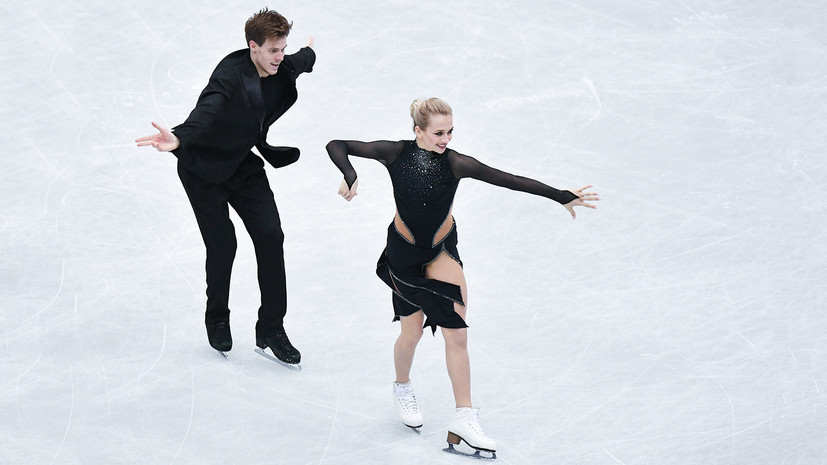On the second day at the World Championships in Japan, an incident was discussed on the warm-up of girls: a Korean woman Lim Eun-Soo and an American Mariah Bell clashed on the ice. The media even reported that a figure skater from the United States allegedly deliberately crashed into a rival to injure her. A similar incident occurred with figure skaters Tony Harding and Nancy Carrigan 25 years ago. The International Skating Union had to make an official statement and report that the incident was settled.
In ice dancing at the warm-ups, there are ten skaters at once, not six, like girls, but they are not used to complaining about "intolerable" conditions. Although the rumor in the media that someone had cut someone, pushed and even sent aboard enough opportunities. But the dancers somehow manage to share the space between themselves and not attract too much attention to themselves.
Competitions in dances began on the third day of the World Cup - the Japanese organizers were not as interesting as the solo skating. For fans, the schedule is quite comfortable, but the athletes had a hard time - they need to start warming up with the morning workout.
The Russian duo Victoria Sinitsina - Nikita Katsalapov was even harder than the favorites. The silver medalists of the Grand Prix finals were placed in the penultimate group of participants, and the draw also gave them the earliest number. But if athletes have a class, then they don’t care when to perform. Sinitsina and Katsalapov with passion began to argue that they made a mistake in rhythm dance at the European Championship in Minsk by chance.
And the judges agreed with their arguments. Each element of the Russians received a fourth difficulty level, except for a twizzle from Katsalapov, rated for the top three. Wards of Alexander Zulin broke the world record of Gabriela Papadakis and Guillaume Sizerona - for now, however, only in technical evaluation. But the final result was also impressive - as much as 83.94 points. Personal record in rhythm dance, the pair raised by as much as six points.
None of the other dancers of the penultimate group caught up with Sinitsin and Katsalapov. Canadians Caitlin Weaver and Andrew Poje were able to get closer to them the closest, losing 1.1 points to the Russians. Their compatriots Piper Gilles and Paul Poirier, too, overcame the mark of 80 points, without which, in essence, the World Championships have nothing to do.
Italians Charlene Gignard and Marco Fabbri, who opened the last warm-up, received fourth levels for all the elements, but they were left behind by the Russians with 81.66 points. The champions of the four continents Madison Chock and Evan Bates, although they improved their twizzles compared to last season, but also failed to climb to first place, losing at the same time to Weaver and After. They did not cope with Sinitsina and Katsalapov and Madison Hubbell and Zachary Donohue - the Americans scored 83.09 points.
After that, there are only two couples left who took the first two places in the last European Championship. For Alexander Stepanov and Ivan Bukin, as always, it was disturbing - too often the judges inexplicably underestimated their assessment. But this time, all the elements of their rhythm dance received the coveted fourth levels. Is that in the components Stepanova and Bukin lost a little bit to North American couples, but still took an intermediate second place - the medal in rhythm dance brought them only one-hundredth of the points, won by Hubbell and Donohue.
With such assessments of Russians, there was hope that Gabriela Papadakis and Guillaume Sizeron would be left behind - quite recently, ratings for 83 points seemed inaccessible to them. But in the end, they raised their world record by almost four points and stopped at 88.42 points, already very close to the absolute maximum. Suffice it to say that the pair received 9.96 points out of 10 possible for the artistry and beauty of the performance.
Unfortunately, the Russians are unlikely to be able to compete for gold. But the dispute over silver and bronze remains open, and here Russian couples have good chances. Dance duets from Russia have not won the World Cup medals since 2013, and at once two places on the pedestal of honor have not been occupied since 1997.
Note that in the pairs competition the Russian team won two sets of world championship awards. Evgenia Tarasova and Vladimir Morozov took, as a year ago, the second place. Natalya Zabiyako and Alexander Enbert became bronze medalists, winning the first medals at the World Championships in their careers. Another domestic duet, Alexandra Boikova and Dmitry Kozlovsky, finished sixth.

